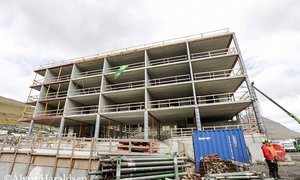In the Faroes not a single drop of oil has been produced yet, but this situation has not prevented income from large oil revenues. In total the Faroese society has made app. 200 million kroner directly from the oil industry, since oil exploration efforts begun seven years ago
It pays to explore for oil. This is absolutely clear if you look at the income made by the Faroe society, linked to oil exploration in one way or another. Or more correctly, if we just look at part of these incomes.
An overview compiled by Jarðfeingi shows that during the period from 2000 to the awarding of the first exploration licenses and upto 2006, some of the oil revenues had reached 200 million kroner. In the overview, it is stressed that these are not all the oil revenues, but just some and the period is to end of 2006.
The actual income most probably began in 2001, when drilling started upon the first exploration well in south western part of the Faroe plateau. Drillings continued until 2002, when the last drilling from the first round was completed. Oil revenues however, did not stop there, but did fall somewhat if you study the tax incomes for individuals and companies.
According to the Jarðfeingi overview, incomes from tax and exploration licenses (acreage payments) totalled 19,5 million kroner in 2001, in 2002 they were 22,3 million and during the years 2003 – 2006 between 7 and 9 million. On top of this are duties from the sale of seismic licenses issued to Western Geophysical from 1994-95 gave app. 15 million kroner.
The largest amounts however stem from the support of various industrial competence, which during this period represented 107 million kroner. Of these, 90 million were agreed ultimo 2006, while the remaining 17 million either are or will be agreed sooner or later for various projects.
No total overview of all the revenues
Mr Petur Joensen, principal at Jarðfeingi told Sosialurin that there are other incomes, for example from Faroe companies working in the oil industry and the taxing of them. However they have not been recorded specially at the Inland Revenue so it is impossible to see and record them.
Neither is there direct or indirect incomes from the Sindri fund, which is a fund established by oil companies in the year 2000, and which objective is to support scientific research within the oil industry, included in the overview. It has to be said that several of these projects are being conducted at foreign institutions and universities, and therefore it is difficult to evaluate how large a part of the money flows through the Faroe economy.
-“Sindri is of a special nature, which possibly can be compared to the work done by the oil companies in connection with the Faroe area. Expenditure of that work is not calculated as an income for the Faroe society. It is all a question of definition”, Mr Joensen points out.
He stresses that the overview is only intended to highlight what incomes the various posts in the overview have generated. Therefore we are talking of a minimum amount of 200 million kroner, which the Faroe society has gained from oil exploration. The actual amount is somewhat higher than this.














